The NHL announced Carson Soucy is suspended one game for his cross-check on Connor McDavid on Sunday night while Nikita Zadorov got a $5000 fine for another cross-check on McDavid a split-second before the Soucy cross-check. There seems to be a theme here but I can't quite put my finger on it…
*
Filip Chytil did not play in New York's potential clinching game on Monday night. The team has said he's out with an illness but given hhere,ery recent, very severe injury history, and this being the playoffs, a skeptical eye is necessary. Let's just hope the young man is doing well.
Brett Pesce was still not in the lineup for Carolina in that game, either.
In the good-news department, though:
He was not in the lineup, but that Blake Wheeler was in a contact jersey is a good sign for a return relatively soon.
It was a wild Game 5 between New York and Carolina as the Rangers took a 1-0 lead into the third period thanks to a short-handed goal from Jacob Trouba (no, really). However, Carolina had been playing much better in the second half of the contest and started to get rewarded for it in the third period.
Carolina's onslaught began thanks to Jordan Staal who turned back the clock to his Pittsburgh days and scored this beautiful goal:
A few minutes later, Evgeny Kuznetsov would bang home a rebound to put Carolina up 2-1 and then, a few minutes after, that Jordan Martinook fired home a puck from the slot to extend the lead to 3-1. Martin Necas added an empty-netter and the Hurricanes would hang on for the win to push us to a Game 6 back in Raleigh on Thursday night.
Kuznetsov is now up to four goals in 10 games these playoffs.
*
About an hour before Colorado and Dallas were set to start Game 4, the NHL announced that Avalanche winger Valeri Nichushkin had been suspended for violating the terms of the program. Nichushkin was in the Player Assistance Program during last year's playoff run and was back in the program this season as well. Violating the terms of the program means a six-month suspension and then he has to apply for reinstatement. This is clearly not a good situation and let's just hope he gets the help he needs, and stick with whatever plan is formed.
(Note: an earlier version of this report stated the reasons for his suspension but this has not been confirmed by the team or the league so that portion has been edited.)
Devon Toews was also a game-time scratch, so Colorado had their work cut out for them.
It was a game that seemed over fairly early, and in a different way than earlier games this series where Dallas blew (or nearly blew) a three-goal and a four-goal lead. Dallas took the game 5-1 and they also had a 28-13 lead in shots after two periods. This was a domination by the Stars, and now Colorado is on the brink of elimination with Game 5 back in Dallas on Wednesday night.
Wyatt Johnston came up huge again for the Stars as he had two goals (one PP, one SH) and an assist with eight total shots and a block. Miro Heiskanen had a goal, two assists (one PP), three shots, four blocks, and a hit in a great multi-cat night.
Sam Steel and Evgenii Dadonov scored the others for the Stars, with Steel also adding an assist on Johnston's short-handed tally.
Casey Mittelstadt scored Colorado's lone goal. Josh Manson had four shots, two blocks, two PIMs, and four hits in a solid peripheral performance.
Jake Oettinger stopped 24 of 25 shots in the win. He has had some shaky games but is now up to a .923 save percentage overall in the playoffs.
Roope Hintz blocked a shot late in the first period and left at the end of the frame. He did not return, so that's something to keep an eye on.
*
We are past the halfway mark of my offseason reviews of the 16 non-playoff teams and that continues today with the Calgary Flames. We have already gone over the San Jose Sharks, the Chicago Blackhawks, the Anaheim Ducks, the Columbus Blue Jackets, the Montreal Canadiens, the Arizona Coyotes (now in Utah), the Ottawa Senators, and the Seattle Kraken. Let's go over what went wrong for Calgary, what went right, and where they go from here, with all this put through a fantasy hockey lens.
Data from Natural Stat Trick, Evolving Hockey, HockeyViz, and Frozen Tools with salary cap data from Cap Friendly. Any tracking data is from AllThreeZones unless otherwise noted.
What Went Wrong
When looking back at the 2023-24 Calgary Flames, the one thing that stood out as a problem didn't matter a whole lot for fantasy as the big problem was backup goaltending. Up until the Trade Deadline, the Flames were 22-16-2 in games started by Jacob Markstrom, or good for a 94-point pace. Games started by any other Calgary goalie produced a 9-10-3 record, or good for a 78-point pace. That poor play from Dan Vladar and Dustin Wolf had the Flames well out of a playoff spot, and all of Elias Lindholm, Noah Hanifin, and Chris Tanev were traded in February and March.
It was a giant gap between Markström and his backups. By Goals Saved Above Expected at Evolving Hockey, Markström managed 0.61 per 60 minutes while Wolf and Vladař combined for -0.53 per 60 minutes. That is a chasm over one full goal per 60 minutes saved by Markström compared to the aggregate of Wolf and Vladař. Wolf was a lot better over the final month of the season, but it should give some pause as to what to expect from Calgary if Markström is traded (which we'll get to later).
Jonathan Huberdeau had another poor season with 12 goals and 52 points in 81 games. His 19 power play points, 60 hits, and 49 penalty minutes may have saved him a bit in some multi-cat leagues, but certainly not in salary cap formats.
This isn't a matter of bad luck or something, either. In Huberdeau's last season with Florida, when he had 115 points and was voted into the top-5 for MVP, he finished in the second tier of forwards by 60-minute scoring chance assist rate at 5-on-5 (SCA/60), or how often he had a helper on a teammate scoring chance. He wasn't at the very top of the league, but he was in great company:

Notably, Huberdeau also had 66 assists off the rush in those 410 minutes, which were just passes that led to teammate shots off the rush, not specifically assists on goals.
The first season in Calgary wasn't kind to Huberdeau as his production cratered and his SCA/60 fell off considerably. In fairness to him, he was still very good, but more so at the low-end of a top-line rate rather than among the elite:
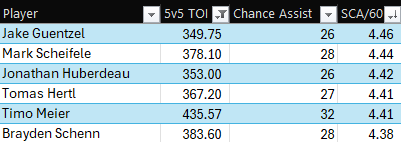
Off the rush, his rate fell from 9.64 per 60 minutes in 2021-22 to 4.42 per 60 minutes in 2022-23. Not only was his playmaking falling off, but the quick-strike offence from Florida was not a focus in Calgary.
We would not be doing this exercise if things improved in 2023-24. In fact, things were very, very bad. Huberdeau's SCA/60 rate fell under the league average and ended up less than half the rate from his final year in Florida. In a span of two years, he went from comparable to Nathan MacKinnon and Aleksander Barkov to this:
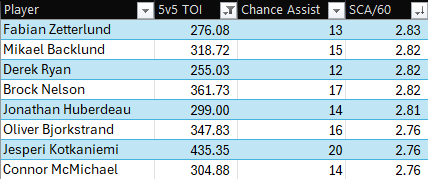
Assists off the rush increased, but there has been such a huge decline in overall playmaking that the rush improvement was nowhere near enough to make up for the chance assist reduction.
We will get to Calgary's offseason later in the piece, and there may be a chance to add to the roster in a significant way, but the team has 13 forwards signed for next season, including depth pieces and young prospect-types. The supporting cast Huberdeau had this season is going to be mostly the same next season.
It was not a good campaign for Andrew Mangiapane, either. It has been a precipitous scoring drop for the 28-year-old winger as his stretch from 2019-2022 saw him score 1.33 goals per 60 minutes and shoot 18.2% in 206 games; the last two seasons have seen those numbers crater to 0.72 goals/60 and 10.2% shooting. He once had a three-year goal rate comparable to names like Matthew Tkachuk, Tyler Toffoli, and Alex DeBrincat and his last two years have seen him closer to names like Matias Maccelli, Jeff Carter, and Kevin Hayes.
The curious part is Mangiapane's involvement in the scoring. His 2023-24 season saw him register a point on 57.1% of Calgary goals scored with him on the ice, his second straight season under 60%. Each season from 2019 through 2022 saw him exceed 60% and he was over 70% twice. The question is what is going on here?
One answer may be found in the transition data. Here is how Mangiapane has fared by different neutral zone tracking numbers like rate of zone entries, carry-ins on zone entries, percentage of entries carried in, and percentage of entries with a pass in each of the last three seasons compared to the league average and his team average starting with 2021-22:

Moving on to 2022-23:

And finally, this past 2023-24 season:

In two years, Mangiapane went from comfortably above both the team and league average in some key transition/zone entry numbers to below both the team and league average by entry rate, carry rate, and pass percentage on entries. Like Huberdeau, there has been a big drop in some key tracking data that used to look very good for Mangiapane. As he's become less involved in the team's transition play, he's become less involved in their goal scoring.
This doesn't feel like a teammate problem. Mangiapane's most common line mate at 5-on-5 from 2019-22 was Mikael Backlund, and the centre was also Mangiapane's most common line mate in each of the last two seasons. This feels more like a team problem as the Flames forwards have seen their combined rush contributions per 60 minutes fall over 24% in two years. Reduced play off the rush with fewer controlled zone entries has not been good to Mangiapane and as a forward that doesn't produce huge peripherals or get much power play time, he needs that even strength production to float his fantasy value. If the team keeps playing like this, there are very real questions about how far he can realistically bounce back.
The last player whose decline is worth noting is defenceman Rasmus Andersson. After posting 50 points in 82 games two seasons ago, and 49 points in 79 games last season, he landed with 39 points in 79 games this season. The upside is that with over two shots per game, 186 total blocks, and 47 penalty minutes, there was still some peripheral value. However, what made him a coveted blue liner were those peripherals with 50-point potential. If it's now a 40-point ceiling, that changes the equation.
The entire problem was the power play. Andersson's usage has declined in each of the past two seasons, peaking at 59.2% in 2021-22 before landing at 47.3% in 2023-24. Andersson's problem wasn't because he was hurt, or a key prospect saw an ascension, but rather poor performance. The 2021-2023 stretch saw him on the ice for 9.7 goals per 60 minutes with the man advantage, a rate that put him in the company of names like Victor Hedman and Roman Josi. In 2023-24, that rate cratered to 4.3 goals per 60 minutes, or much worse than Justin Schultz in Seattle or Seth Jones in Chicago.
It is hard to pin it on the team, too. With any defenceman but Andersson on the ice, Calgary's power play scored 8.5 goals per 60 minutes. The difference is driven by shooting percentages, so there is hope for Andersson to rebound next season, but he may have already lost the role to MacKenzie Weegar or Daniil Miromanov, and unless they both fall on their faces, Andersson may not get that role back for any extended period. It makes him a volatile fantasy option for 2023-24.
What Went Right
For a team that missed the playoffs by 17 points, there was actually a lot that went right.
We will start in net with Markström. He was discussed earlier but he had a great rebound season and though a bad final month of the season made his overall numbers look worse, he rebuilt his trade value. Head-to-head fantasy owners may have quibbles because he did not do much in H2H playoffs, but he was excellent for five months.
Nazem Kadri had a great year. He played all 82 games for the second season in a row, and the helped him to 29 goals (his highest mark since 2017), 75 points (the second-highest mark of his career), 22 power play points (also the second-highest mark of his career), and 277 shots (a career-high). Hits and penalty minutes declined, so it wasn't all roses, but he was the engine of the offence as this is what Calgary managed with him on the ice (red is good, and the darker the better):
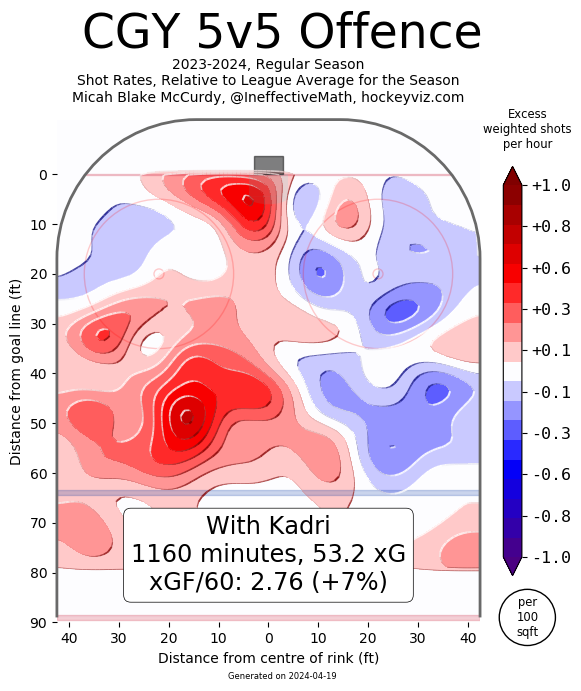
And what they did with him off the ice:
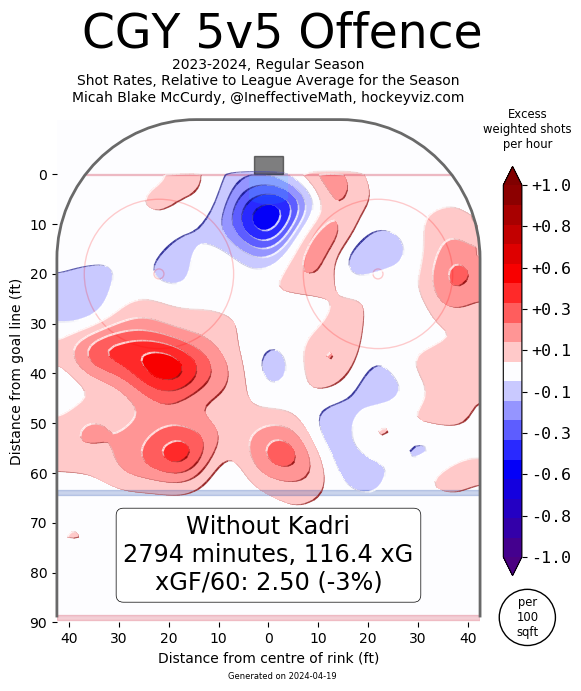
That jives with the transition data as he had a preposterous number of zone entries, exceeding 29 per 60 minutes. Overall, only Nikolaj Ehlers was higher and though Kadri's carry-in rate was much lower than Ehlers, when combining with passing plays on entries, the center compared very well to a couple of high-end wingers from the West:

The Stanley Cup winner from 2022 turns 34 years old in October so how much longer he can keep doing this is a fair question. There weren't many signs of slowing down, though, and he's now clearly the top offensive option up front, so he will get high usage until the wheels fall off.
It was a career year for Blake Coleman as he reached the 30-goal mark for the first time (previous high of 22 in 2018-19), totaled 54 points (had never surpassed 40), 76 penalty minutes (also a career high), and had six short-handed points for those in fantasy leagues that count that. With 128 hits and 2.5 shots per game, it was a banner multi-cat season for the 32-year-old winger.
Unlike Kadri, there are clear red flags with Coleman. He shot 15.7% after never shooting higher than 10.5% in any season where he's played 60 games and a three-year average of 9.2%. Coleman also figured in on 76% of goals scored with him on the ice at 5-on-5, the highest mark of his career, and that was with a massive decline in some playmaking numbers and poor zone entry rates. A 32-year-old with a lot of career – or near-career – highs and not much (or anything) to speak of in the way of underlying improvements should set off alarm bells, even if he skates 17 minutes a night.
There were good rookie efforts from both Connor Zary and Martin Pospisil. They finished third and fourth, respectively, among the team's regular forwards by points rate at 5-on-5 (at least 400 minutes played), though Zary did that by shooting 18.3% at that strength. Pospisil did it while shooting 7.3%, so there was a difference in that sense, and he also had an absurd 238 hits and 109 penalty minutes in 63 games. He was a great multi-cat player, though he'll have to tone the aggression a bit as he's already gaining a reputation for going over the line too often.
Pospisil, in particular, had some good under the hood, too. His scoring chance assist rate was 4.97 per 60 minutes, and this was the company he kept:

It is fair to say the sample isn't big (it isn't) and that playing with Kadri helped (it did), but Pospisil rated much better in this regard than Zary, and those three often played together. It can't all be Kadri, and this is a good sign for Pospisil to carry some production value moving forward, on top of all those peripherals.
Yegor Sharangovich had a great season with 31 goals, but he also did that by shooting 17.3%. His career average was 12.8% across his first three seasons and he peaked at 14.3%. This isn't a guy that puts up much for peripherals like shots, penalty minutes, or hits, so if he's a 20- to 25-goal scorer rather than a 30-plus option, it changes his fantasy value a lot.
Lastly, it was a great year for MacKenzie Weegar. He had career-highs in goals (20), points (52), power play points (15), shots (208), blocks (200), and hits (194). His shooting percentage was a big reason for that with a career-best 9.6%, but even he shot 4%, he would have scored eight goals (tying a career-high) and posted 40 points. With those kinds of peripherals, that is still a tremendous multi-cat season. If he can hold onto that top PP role in 2024-25, he goes from a great multi-cat option to an elite one.
Where Do They Go From Here?
Calgary is in a tough spot. Trading Matthew Tkachuk for Huberdeau and Weegar, signing Kadri and Coleman, and hanging onto Markström this long was all done in the name of keeping the team as a contender. After missing the postseason for two straight seasons, and all those players in their 30s, things have not gone to plan, and any sort of turnaround is difficult to forecast.
If this team wants to get back to playoff contention, they need young guys like Zary, Pospisil, Wolf, and Matt Coronato to be difference-makers. Maybe a prospect that hasn't reached the NHL yet like Samuel Honzek and Hunter Brzustewicz can make an impact. If veterans like Huberdeau and Mangiapane have reached their limit, Coleman takes a step back, and Markström is traded, they need those young guys to step up. Whether they can do it is up for debate, though both Zary and Pospisil have made positive strides.
There is also a cap problem. They do have expensive, long-term deals for a few players, but they also have nearly $20M in cap space for this offseason. They likely re-sign Oliver Kylington, but with him out of the NHL for two years and just 114 games played over the last four seasons, he won't be expensive. There are some low-cost RFAs that can be extended, but Calgary can make a splash in free agency. The issue is that if they swing and miss on an expensive free agent – maybe someone like Brandon Montour or Brett Pesce – then that just adds to their cap misery down the road. It would limit what the team can do in future seasons if the young players really take big steps forward over the next couple of years.
Calgary does have draft capital to work with by having multiple picks in each of the first four rounds of the 2024 Draft. They could go the trade route and target a younger player, so they at least have options, and flexibility is very important.
The big name is Markström. There were a lot of rumours he would be traded at the Deadline in March but that never materialized. He has a no-move clause, but it seems he'd be open to a deal to a contender, and he's been a top-10 goalie over the last three seasons, even with a down year in 2022-23. He can be packaged with some of those draft picks and get a real good return from a Cup hopeful needing an upgrade in net. We will cross that bridge when we get to it because they might not want to turn the keys over to Wolf just yet.
Fantasy managers should still be a bit leery of this situation. Guys like Sharangovich and Coleman seem primed for a regression, Huberdeau and Mangiapane have lost their production in this new Flames era, and Mikael Backlund will be in his age-35 season while Kadri will be 34. That is basically the team's top-6 forwards that all have legitimate concerns about their effectiveness in 2024-25. They have good young options like Zary and Pospisil, but they need more games to really prove themselves. And if the team signs or trades for a high-end, puck-moving defenceman, there are a lot of mouths to feed on the blue line for a team that almost certainly won't be a high-end scoring roster.
That reticence in the fantasy game mirrors the real-world situation. If Huberdeau and Mangiapane rebound even modestly, the regressions for Coleman and Sharangovich aren't severe, Kadri repeats his performance, Backlund remains a very good two-way centre, the young wingers solidify themselves as good middle-6 scorers, a big-name defenceman is brought in to help stabilize the back end with Weegar, Kylington, and Andersson, and Wolf becomes the NHL goalie he's been in the AHL, it isn't hard to imagine this team being much better in 2024-25.
However, that is a lot of "if" statements. We should reserve judgment until their offseason unfolds, but it isn't hard to imagine this team being more-or-less the same in 2024-25 that they were in 2023-24, both in our fantasy game and in real terms. There will be players worth drafting in most any multi-category fantasy league – Kadri, Pospisil, Weegar – but a modest offence doesn't often produce elite fantasy skaters.

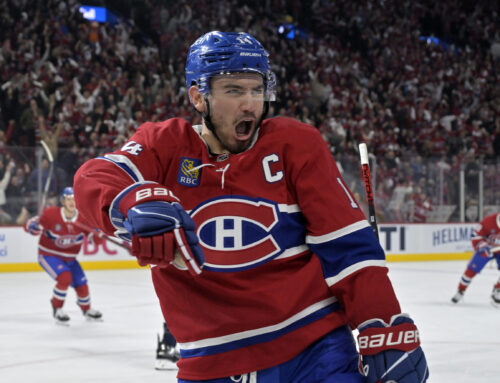
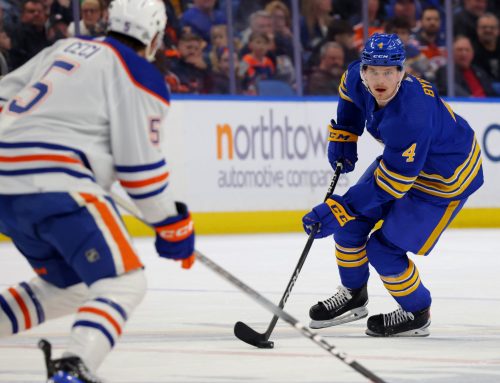
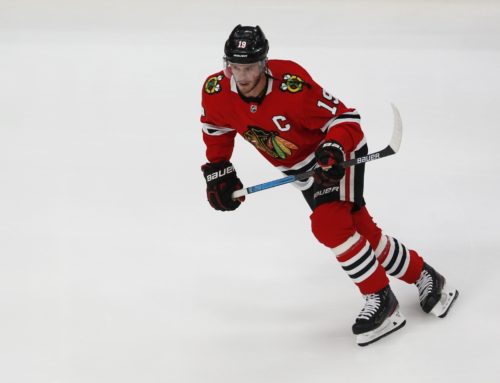
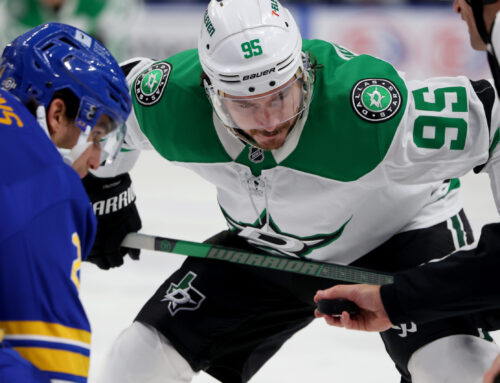
 BUF
BUF NYR
NYR CHI
CHI EDM
EDM CBJ
CBJ VAN
VAN S.J
S.J PIT
PIT
